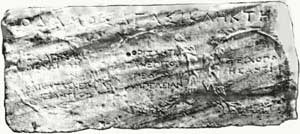
Decree honoring Diophantos
Inscription honoring the emperor Zeno
Civic Oath of Chersonesos
Decree honoring Syriskos the historian
Base of statue for Agasikles
Proxeny decree for an ambassador from Mithridates Eupator
Decree honoring ambassadors from Herakleia
Base of statue for Aristonos
Treaty of alliance with the king Pharnakes I
List of those who won sport competitions
Inscription about the tax on prostitution
Fragment of a decree about the fortress of Napites
Inscription about construction of a city gate
Dedication to the goddess Nemesis
Inscription regarding the liberation of Kalos Limen
Decree honoring the emperor Marcus Aurelius
Decree honoring Gaius Julius Satyrus
Proxeny for a citizen of Sinope
Epitaph in verse on stele for Xanthos
Inscription on the stele set up by doctor
Epitaph in verse on stele for Oinanthe
Short epitaphs
Originally published by Vasiliy Vasil'yevich Latyshev, commentary by Ella Isaakovna Solomonik

This base of statue is made of white marble and dates to the 3rd century BC. According to Pavel Sumarakov's information, it was discovered in 1794 and then transported to Odessa. After the Second World War, the stone was handed to the museum of Chersonesos, where it is stored at this moment. There are eight inscriptions carved in its sides and encircled by relief ivy and laurel wreathes. Some of the inscriptions are greatly damaged.
Text:
«The people (set up the statue of) Agasikles, son of Ktesios.
(in the wreathes:)
Who proposed the decree of the garrison and organized it.
Who delimitated (or planted) vineyard in the plain.
Who was a wall-builder.
Who organized (?) the marketplace.
Who was a strategos.
Who was a priest.
Who was a gymnasiarchos.
Who was an agoranomos».
Commentary:
This Agasikles was awarded with highest honors undoubtedly because he was a great public figure in Chersonesos: he was elected to important state posts and provided several measures to improve the chora and the city and to strengthen the defense of the latter.
Strategos - meant "general", who was usually elected annually to command the army (militia).
Gymnasiarchos - was one of the most honorable offices in Greek city-states. Gymnasiarchos was responsible for training and teaching the youth and sport competitions organization. No public funds were granted for these purposes, so rich people were usually elected gymnasiarchoi.
Agoranomoi - were those who controlled the marketplace. Their duties included the establishment and controlling the order of the trading places, and perhaps the price controlling of certain commodities; they also had the lists of all craftsmen in the city. This was an elective office.